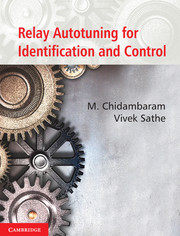Book contents
- Frontmatter
- Contents
- List of Figures
- List of Tables
- Acknowledgements
- Preface
- 1 Introduction
- 2 Improved Autotune Identification Methods
- 3 Cascade Controllers Tuning by Relay Autotune Method
- 4 Simultaneous Relay Autotuning of Cascade Controllers
- 5 A Simple Method of Tuning Cascade Controllers
- 6 Improved Saturation Relay Test for Systems with Large Dead Time
- 7 Identification of FOPTD Model using Single Symmetrical Relay Test
- 8 Autotuning of PID Controllers for Unstable FOPTD Systems
- 9 Autotuning of PID Controllers for Critically Damped SOPTD Systems
- 10 Estimation of SOPTD Transfer Function Model
- 11 Estimation of Five Parameters of Unstable SOPTD Model with a Zero
- 12 Identification of FOPTD Multivariable Systems
- 13 Identification of SOPTD Multivariable Systems
- 14 Tuning of Multivariable Controllers for Non-Minimum Phase Systems
- 15 Tuning of Multivariable Controllers by Genetic Algorithms
- 16 Summary and Conclusions
- Appendix A
- Appendix B
- Appendix C
- Nomenclature
- Problems
- Suggestive Reading
- References
- Index
8 - Autotuning of PID Controllers for Unstable FOPTD Systems
Published online by Cambridge University Press: 05 June 2014
- Frontmatter
- Contents
- List of Figures
- List of Tables
- Acknowledgements
- Preface
- 1 Introduction
- 2 Improved Autotune Identification Methods
- 3 Cascade Controllers Tuning by Relay Autotune Method
- 4 Simultaneous Relay Autotuning of Cascade Controllers
- 5 A Simple Method of Tuning Cascade Controllers
- 6 Improved Saturation Relay Test for Systems with Large Dead Time
- 7 Identification of FOPTD Model using Single Symmetrical Relay Test
- 8 Autotuning of PID Controllers for Unstable FOPTD Systems
- 9 Autotuning of PID Controllers for Critically Damped SOPTD Systems
- 10 Estimation of SOPTD Transfer Function Model
- 11 Estimation of Five Parameters of Unstable SOPTD Model with a Zero
- 12 Identification of FOPTD Multivariable Systems
- 13 Identification of SOPTD Multivariable Systems
- 14 Tuning of Multivariable Controllers for Non-Minimum Phase Systems
- 15 Tuning of Multivariable Controllers by Genetic Algorithms
- 16 Summary and Conclusions
- Appendix A
- Appendix B
- Appendix C
- Nomenclature
- Problems
- Suggestive Reading
- References
- Index
Summary
Using a single symmetric relay feedback test, a method is proposed to identify all the three parameters of a first order plus time delay (FOPTD) unstable model. It is found by simulation that the relay autotune method gives -23% error in the calculation of ku, when D/τ = 0.6. In the present work, a method is proposed by incorporating the higher order harmonics to explain the error in the calculation of ku and to estimate all the parameters of an unstable FOPTD system. Two simulation results are given on unstable first and second order plus time delay transfer function models. The estimated values of the parameters of the unstable FOPTD model are compared with the methods of Majhi and Atherton (2000) and Thyagarajan and Yu (2003). PID controllers are designed for the identified model and for the actual system. The proposed method gives results close to that of the actual system. For a second order plus time delay system, the latter two methods fail to identify the FOPTD model. Simulation results are also given for a non-linear bioreactor system. The PID controller designed on the model identified by the present method gives a performance closer to that of the controller designed on the locally linearized model.
Introduction
As stated earlier, the relay feedback method has become very popular because it is time efficient as compared to the conventional method. The amplitude (a) and period of oscillation (pu) are noted from the sustained oscillation of the system output.
- Type
- Chapter
- Information
- Relay Autotuning for Identification and Control , pp. 105 - 119Publisher: Cambridge University PressPrint publication year: 2014



